The mysteries of Japanese culture and the peculiarities of cuisine attract and fascinate. That is why the dishes of the Land of the Rising Sun have actively spread and found their niche in the restaurant business and our diet. More and more often they are ordered assorted for a large group; you can even buy a cake made from Japanese rolls. But many people still don’t know how many rolls are stored and in what conditions, and whether they can be prepared for future use and frozen. Let's figure out how ordinary people, far from the intricacies of Japanese cuisine, can distinguish a low-quality product.
So let's get started!
Deadlines
Of course, any Japanese will tell you that Sushi, Sashimi, Makizushi, Futomaki, Hosomaki, Temaki, Gunkan-maki and others are prepared only from the freshest ingredients. In Japan, fish caught more than 4 hours ago is considered unsuitable for them.
In Russia this is simply impossible, and frozen fish is used for cooking, which, of course, affects the taste and quality of the product. And no one can tell you how much time passed before it was frozen, and whether it was subject to repeated defrosting. Therefore, it is better to purchase or prepare Japanese rolls with salted or smoked seafood.
In a refrigerator
The shelf life of rolls in the refrigerator depends on the composition and initial freshness of the ingredients.
- with raw fish or unsalted caviar - 12 hours (or better immediately after cooking);
- with salted fish, smoked eel, shrimp and other seafood after processing - 18-24 hours;
- with poultry, eggs, meat, fish after heat treatment - 24 hours;
- vegetarian (with vegetables) - 48 hours;
- sweet, with fruit - 6-12 hours.
There is no need to store hot tempura rolls for a long time, bought in a store or ordered from a sushi bar (yakitoriya or tanuki) for delivery. Eat them on the day of purchase.
At room temperature
The maximum shelf life without refrigeration is no more than 3 hours.
It is also necessary to take into account the room temperature: in the summer, in the heat, sushi left on the table spoils much faster than in winter. Seasoned with soy sauce or containing a mayonnaise-based sauce, such as Caesar, must be eaten within 1 hour.
In the freezer
You should not experiment with freezing ready-made rolls - you will not like the result. The rolls will lose their taste and attractive appearance. The rice will first dry out and then spread due to the moisture released by the vegetables after defrosting.
How to store sushi
Sushi is an appetizing low-calorie dish. There is an opinion that when placed in a special refrigerated display case, they remain fresh and edible for at least a day. How long can sushi actually last? The international standard tells us just three hours.
How long does sushi last in the refrigerator?
Like rolls, sushi is a perishable product, because it is made from almost the same ingredients. If you decide to put them in the refrigerator, use biobags or food foil.
If the composition contains seafood or the dish is generously poured with sauce, then it can sit there for 2-3 hours. Sushi with vegetables, sea grass and beans will keep for up to two days.
Important. After two days, not a trace will remain of the bright taste of the dish. Even when ready for consumption, it will not look very appetizing: weathered rice and fish, dry vegetables. In addition, after 5 hours the rice becomes covered with a tasteless, transparent film, and the entire product acquires a specific smell.
Is freezing sushi acceptable?
Freezing sushi is unacceptable. Not only will the dish be hopelessly spoiled when defrosted, but the risk of poisoning when eating frozen sushi is high.
Storing sushi at room temperature
Room temperature is not the most comfortable for Japanese dishes. If the sushi needs to sit for a while while waiting for guests, wrap it in foil and put it in a dark, cool place for an hour. Storage temperature should not exceed +20°C.
By ingredients
If you prefer homemade rolls and sushi, it is worth discussing the expiration dates of the ingredients included in them.
Rice
It’s ideal if you take special Japanese rice to prepare Philadelphia or California on your own.
When boiled, its shelf life is 12-24 hours.
Of course, it will not deteriorate during this time, but it will stop holding its shape and will fall apart.
You can cook and use regular short grain rice and store it in the refrigerator for up to 3 days.
But no other variety has the stickiness needed for perfect rolls.
Ginger
Thanks to a marinade consisting of rice vinegar, salt and sugar, open pickled ginger can last up to 1 month in a cold place.
The information can be clarified on the packaging, since each manufacturer has its own method of preparation and brine composition.
And prepared independently at home - up to 3 weeks in ceramic or glass containers.
Ginger can be stored in the freezer; it will not lose its taste.
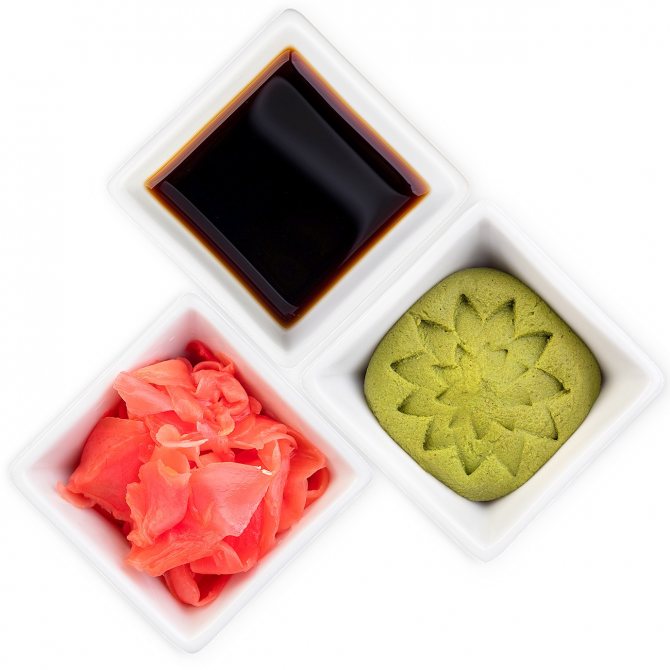
Nori (seaweed)
To prepare sushi and rolls, dried seaweed or rice paper (spring rolls) are used.
If you maintain humidity conditions, you can store nori or seaweed for a very long time.
Its shelf life directly depends on the initial quality of the algae and is 2 years . In open packaging - approximately 1 year, subject to the only condition: very low humidity.
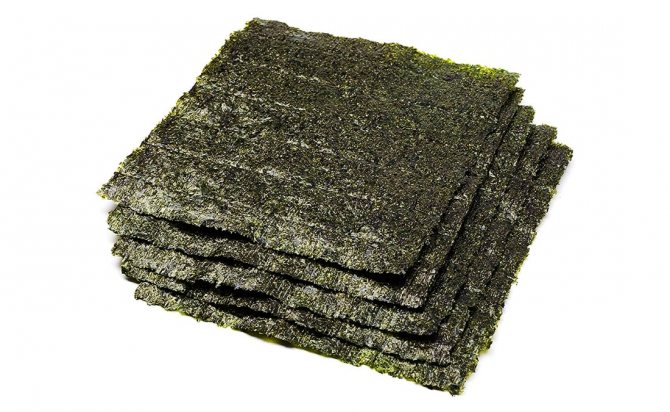
Wasabi
Wasabi is sold in 2 consistencies: powder and paste. The shelf life of the powder is almost unlimited.
Depending on the manufacturer's additives, an open tube of paste can be stored in the refrigerator from several days to a month. Closed - lasts up to 2 years.
However, you must adhere to the dates indicated on the packaging.
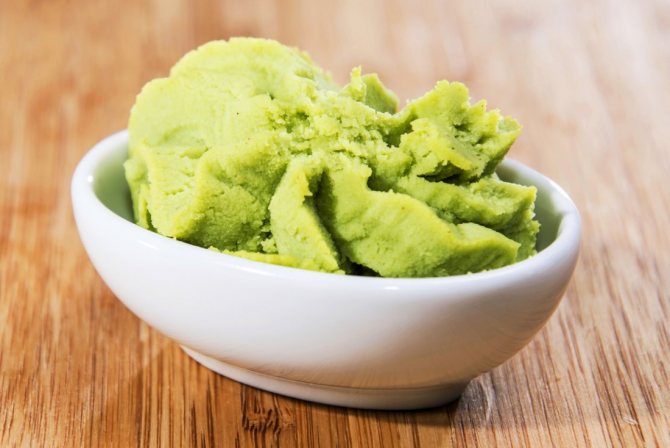
Poisoning from rolls and sushi
Poisoning from rolls and sushi is a common occurrence these days. In pursuit of good earnings, owners of sushi bars and restaurants neglect the rules. They often freeze fish or buy a lower quality product to save money. Sometimes frozen fish can be stored for a very long time.
In general, all dishes containing raw food carry the risk of poisoning if the product is not stored correctly and is subjected to long-term freezing. It is best to give preference to dishes with smoked or salted fish.
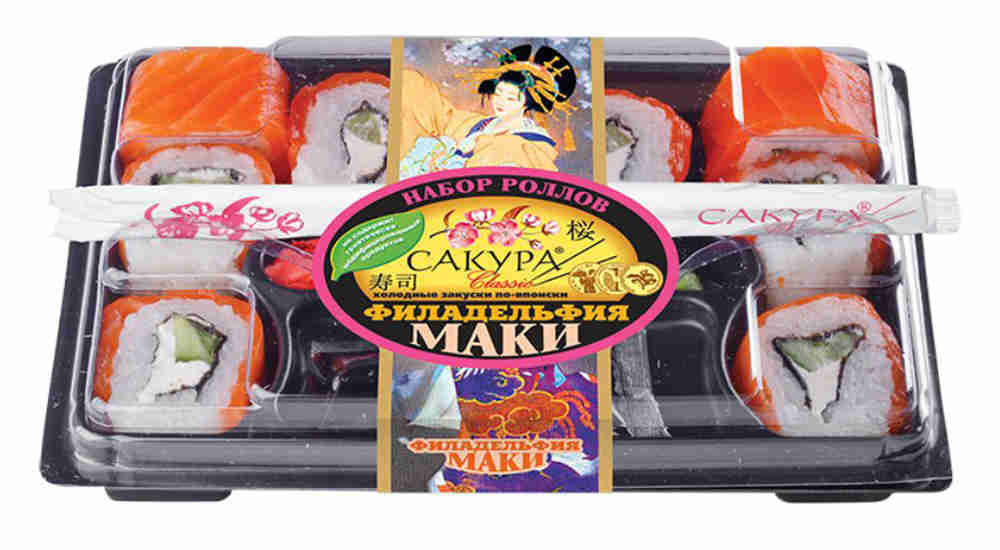
Some marine fish meat contains heavy salts and mercury. In small quantities it has no effect on the human body, but if you overdo it, you can be poisoned.- If stored improperly, harmful microorganisms can develop in fish.
- Chefs prefer sea fish because it contains virtually no bacteria.
- Ginger and wasabi are served with the rolls , and for good reason. These products have an antibacterial effect and can kill germs that entered your body with the Japanese delicacy.
- Poisoning can be caused not only by fish; if rice is stored improperly, staphylococcus may appear in it.
Call your doctor immediately if you experience the following:
- feeling unwell 30-40 minutes after dinner;
- cramping abdominal pain;
- nausea;
- headache.
Storage recommendations
Dishes
It must be remembered that plastic containers are only used for transporting food after cooking and are not at all suitable for storage.
Masters of Japanese cuisine advise storing sushi on a flat wooden or porcelain surface, repeatedly wrapping it in cling film. But not everyone has special dishes, so it’s quite possible to use a glass or ceramic container with a hermetically sealed lid. Ideally, use a vacuum.
You should not store baked rolls for more than 6 hours - they lose their original taste.
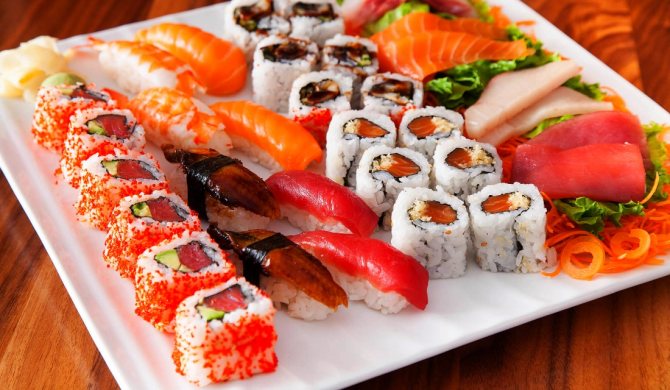
Conditions
The air temperature in the refrigerator should not be lower than +2 degrees, ideally from +2 to +6.
When storing rolls outside the refrigerator, the temperature in the room should not exceed 23 degrees with a relative air humidity of 60-70%. They must be consumed within 1 hour.
When ordering food for delivery, be sure to make sure that thermal bags are used during transportation, since transportation without thermal protection, especially in summer, can lead to product spoilage.
Choosing the right cookware

If everything cooked has not been eaten and the product is planned to be stored in the refrigerator, you need to use a container or jar that closes tightly. If you simply place a plate of sushi on a shelf without covering it with anything, the fish and rice will quickly begin to dry out. In addition, they can absorb foreign odors.
Such storage is especially prohibited if the sushi is covered with sauce on top. Regardless of the composition, this product begins to deteriorate faster than others, which increases the risk of developing a pathogenic environment: bacteria, microbes, toxins.
The only way to keep the rolls fresh the next day is to put them in a plastic container and tightly close the container with a lid . Moreover, this only applies to delicacies with smoked or salted fish. If the product is placed on a plate, it must be wrapped in several layers of cling film, which will delay the drying process.
It is worth considering that it is better not to take a glass dish, but a plate made of ceramics or natural wood. As for plastic bags, it is better to refuse them. The sushi in them quickly becomes deformed; in addition, the bags cannot be sealed airtight.
How to check the freshness of rolls

You can determine the degree of freshness of a prepared dish by its appearance, smell and taste:
- the surface is shiny. After some time, it loses its shine, becomes dull, pale and matte;
- structure – the rolls are soft, juicy, and hold their shape well. After several hours, the rice acquires a grayish color, becomes hard, dry and crumbly, which is why the dish begins to “fall apart”. Time is also “reflected” on other components: algae and vegetables become watery, fish become hard;
- smell – light aroma with a hint of iodine. If a dish “gives off” a fishy, sour or putrid smell, this means that it has already begun to deteriorate.
The preparation of rolls, as a rule, does not involve heat treatment, so in a short time bacteria and various microorganisms quickly multiply in them, which negatively affect our health.
What happens over time during storage?
If storage conditions are not met, decomposition and oxidation reactions occur in the finished product. This leads to the formation of pathogenic microflora and other substances hazardous to health.
If the storage conditions for fish products are not met, the likelihood of helminthiasis increases significantly.
When eating fish that has not undergone heat treatment, there is a risk of becoming infected with herring worms, salmonella or staphylococcus.

Be sure to read:
How long does cheese last in the refrigerator and without: hard, soft, moldy, homemade and processed?
Can I eat it the next day?
If all storage requirements are met, the dish will not only remain suitable and safe for consumption, but will also practically not lose its original taste.
If in the evening the finished product was hermetically packaged and kept in the refrigerator for no more than 18 hours, in the morning it remains quite suitable for eating.
Important: before eating sushi the next day, make sure that it does not have an uncharacteristic aroma or change in consistency.
How can you tell if a product has gone bad?
If you are unsure of the storage conditions or time of the finished dish, its unsuitability for consumption can be suspected by characteristic signs:
- Loss of presentation. Chapped and dry edges, discoloration of rice or filling.
- Uncharacteristic odor: sour, rancid or rotten.
- Change in consistency. Sushi becomes crumbly or, on the contrary, sticky. The nori shell on the rolls is cracking.
- Change in taste.
If any of these signs appear, it is strictly forbidden to use the product for food. Ignoring these conditions leads to food poisoning.
What are the dangers of eating expired sushi and rolls?
If Japanese menu dishes are stored longer than the permissible period or in violation of the temperature regime, bacteria actively multiply in the product.
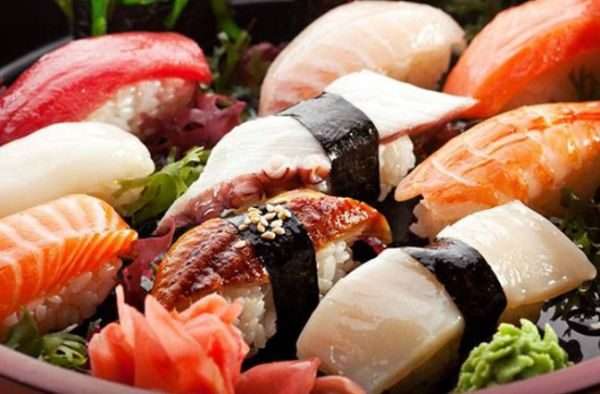
Their entry into the human digestive system results in the following negative consequences:
- Disorders of the gastrointestinal tract: nausea, vomiting, flatulence, loose stools.
- Infection with helminths.
- Food poisoning, accompanied by indigestion, fever, and skin rashes.
The first symptoms of food poisoning appear within one to two hours after eating the dish.
Can rolls be stored in the freezer?

Fish and seafood included in the rolls tolerate freezing well and can be stored in this form for a long time. The same cannot be said for other components. For example, rice dries out when frozen, and when defrosted it becomes watery and tasteless.
Therefore, we strongly do not recommend freezing the product. Even if all the rules of freezing and defrosting are followed, it loses its taste, structure and appetizing appearance, turning into a shapeless mass.
A little history about rolls
Actually, rolls are a type of sushi. Their homeland is the Land of the Rising Sun, or simply Japan. Although the ubiquitous Americans are trying to take the palm here too, arguing that this is how they tried to instill a love of seafood in Americans.
In fact, this is how the fish was transported, covering it with layers of boiled rice. The fish was salted for preservation purposes. Someone tasted it and realized that the dish was very tasty. This is how sushi appeared. Chefs are creative people, which is why modifications of sushi appeared - sashimi and rolls, which can be with meat, vegetarian, even sweet and with fruit.









